2025 Celebrate CTE District Highlights
The DCF Regional School Atlantic Campus is an alternative secondary school designed to meet the needs of youth in transition. This school enrolls individuals from 9th through 12th grade who want to complete their education and earn a high school diploma. A wide variety of supplemental and support services, such as transportation and meals, are available for students.
An exciting new program offered at this school is the Child Development career and technical education program of study. This program includes four foundational courses and a practicum where students engage in hands-on experiences working with young children at their school’s on-site nursery. Jean Piaget’s theory of child development, emphasizing that children learn through play and exploration, is foundational to this early childhood program. Students enrolled in this program of study can also earn the Child Development Association (CDA) Tier II industry-valued credential from the Council for Professional Recognition. The CDA Credential™ is the most widely recognized credential in early childhood education and provides a foundation to advance in the field of early childhood education.
The program requires participating students (junior or senior) to complete 120 clock hours of professional early childhood education, covering the growth and development of children (setting specific), with no fewer than 10 hours in each of the Council for Professional Recognition’s eight CDA® subject areas.
- Planning a safe and healthy learning environment
- Advancing children’s physical and intellectual development
- Supporting children’s social and emotional development
- Building productive relationships with families
- Managing an effective program operation
- Maintaining a commitment to professionalism
- Observing and recording children’s behavior
- Understanding principles of child development and learning
The practicum, consisting of 480 hours of experience, is typically completed over the course of two marking periods, which is slightly more than five months. As part of this program, students also complete a CDA® Professional Portfolio.
Through this program, students can learn valuable academic, technical and employability skills as they pursue rewarding careers in early childhood education that provide a family sustaining wage and opportunities for continued success.
.jpg)
DCF Regional School – Atlantic Campus
.jpg)
DCF Regional School Nursery
.jpg)
DCF Regional School Classroom
Burlington County Institute of Technology – Medford Campus
The Burlington County Institute of Technology (BCIT) – Medford Campus offers two manufacturing career and technical education programs: welding and manufacturing engineering technology/technician. Manufacturing, one of New Jersey’s key industry sectors, involves the planning, managing and performing the processing of materials into intermediate or final products and related professional and technical support activities such as production planning and control, maintenance and manufacturing/process engineering. At BCIT, students engage in hands-on learning and develop a myriad of knowledge and skills including collaboration, communication, critical thinking and problem solving.
Manufacturing Engineering Technology/Technician
The Manufacturing Engineering Technology/Technician career and technical education program of study at BCIT teaches students skills in computer numerical control (CNC) systems, robotics, and Internet of Things (IoT) integration to meet the growing demand for high-tech manufacturing skills in the region. Students are also introduced to using basic machine tools such as belt sanders, drill presses, saws & cutoff machines, pedestal & tool grinders. Students also learn the programming, setup, and operation of CNC turning centers, and are introduced to statistical process control techniques, geometric dimensioning and tolerancing. This program provides real world learning that helps students develop practical skills, confidence and career readiness. The program provides opportunities for students to earn their Haas certifications for both Mill and Lathe operators which are valued by the manufacturing industry.
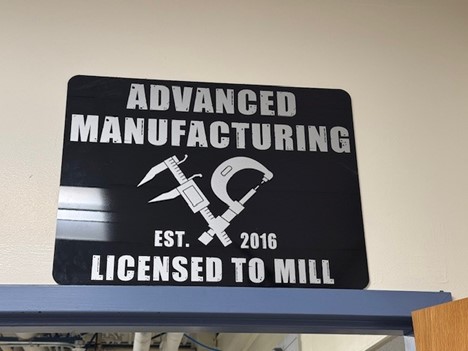

Left to right: Student, Student and Mr. Frank Paul Staff IV, Instructor
Students work on calibrating the CNC lathe to ensure it operates within the tolerances to meet the design specifications.
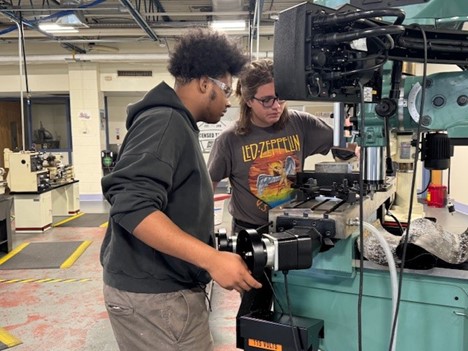
Students work on configuring the milling maching in the manufacturing lab. Calibrating machines is a fundemental practice in manufacturing to ensure accuracy, consistency and the safety of production processes.
Welding Technology/Welder
The welding program of study provides students with a range of learning experiences throughout the three-course sequence. In the initial course, students are introduced to the welding industry, including an overview of the vast array of career opportunities in the field. Students work with virtual reality welding machines where they gain fundamental skills in arc welding. Topics covered include weld positions, terminology, measurements, and various metal types. The importance of safety protocols and regulations essential for welding practices are emphasized throughout the program. As students advance in the program, they learn about the different types of arc welding techniques, including shielded metal, gas metal, flux core, and gas tungsten.
Students apply theoretical knowledge and apply their skills in two arc welding labs in a shop environment. Welding skills in the field of metal fabrication and an introduction to computer controlled thermal cutting are also taught. The welding lab was recently renovated with state-of-the-art equipment and a new ventilation system. Upon completion of the program, students can earn the American Welding Society credential (Tier II) that is valued by the manufacturing industry.
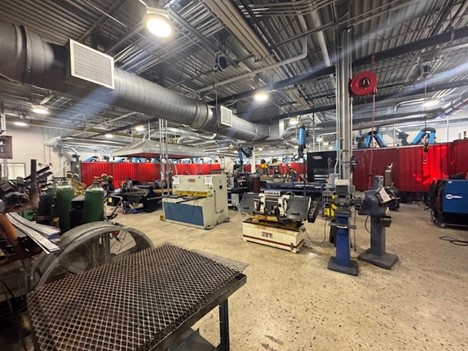
The welding program was remodeled and renovated in 2024 through the Securing Our Children’s Future Bond Act. The facility now includes 30 individual welding booths where students can hone their skills.
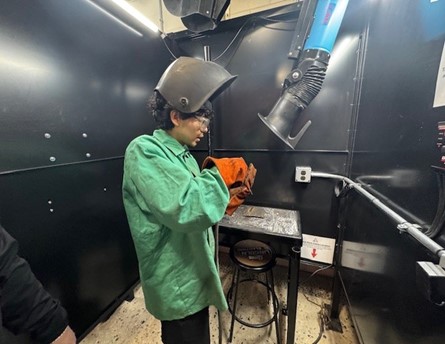
Students can work in lab stations independently once core welding skills are learned.
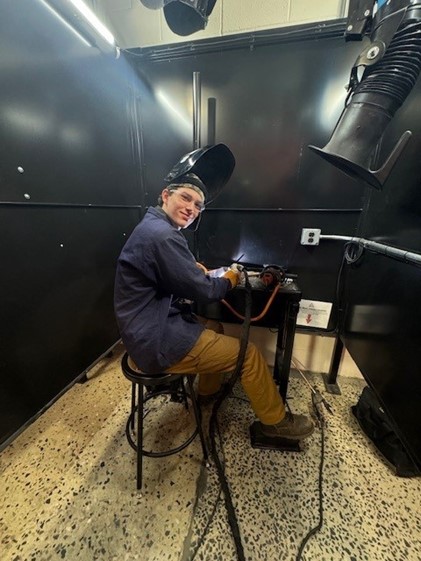
Gas Tungsten Arc Welding, also known as TIG welding, is one of the more advanced skills learned in this program of study.
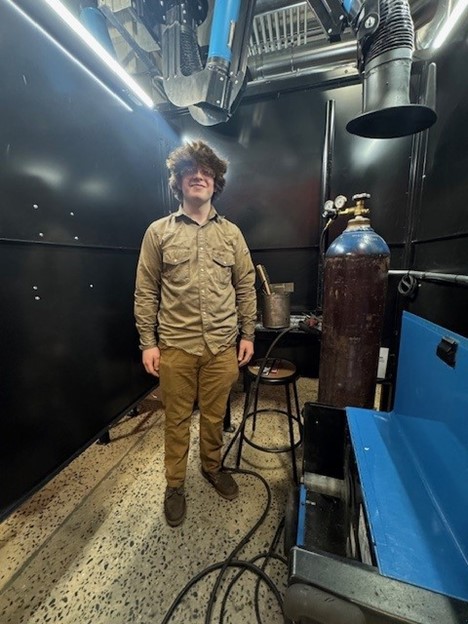
Students apply their theoretical knowledge, comprehensive safety protocols and skills as they learn different welding techniques.
Pennsauken Township Board of Education School District Air Force Junior Reserve Officer Training Corps (AFJROTC)
The mission of Air Force Junior Reserve Office Corps (AFJROTC) programs is to develop citizens of character. The objectives include educating and training high school cadets in citizenship and life skills, promoting community service, instilling a sense of responsibility and developing character, leadership and self-discipline through education and instruction in air and space fundamentals and the Air Force’s core values of Integrity First, Service Before Self and Excellence in All We Do. By Title 10 United States Code, Air Force JROTC is a citizenship program and not chartered as a recruiting program for the military services. Those students who participate in the program do not incur any military obligation.
The AFJROTC curriculum at Pennsauken High School includes a multitude of content areas including aerospace science, leadership education, and health and wellness studies. Aerospace Science includes the history of flight, principles of aircraft flight and navigation, development of aerospace power, rocketry, aerospace industry, cultural studies of major world regions, and cyber technology. Leadership education introduces students to military customs and courtesies, character education, citizenship in the United States, first aid, wellness, basic survival instruction, health and fitness, basic drill, and ceremonies. Additionally, cadets will develop skills such as critical thinking, communication, collaboration, and creativity. Embedded throughout the curriculum is the underlying theme of developing personal integrity, self-discipline, and values such as service and excellence. The program also offers cadets a wide variety of curricular and co-curricular activities.
Community service is integral to the AFJROTC program. Through the AFJROTC Kitty Hawk Honor Society, cadets provide tutoring services to students after school in the media center and participate in other community activities such as local food and blood drives, and bi-annual fall and spring cleanup events in the community.
The Kitty Hawk Honor Society is the academic honor society of AFJROTC that promotes academic excellence, leadership abilities, school and community service, self-confidence and initiative. Being inducted into the honor society provides additional opportunities for leadership experiences and personal development.
Upon completion of the Air Force JROTC program, cadets may be eligible for enlistment at a higher grade in any military branch. This translates to military stripes and higher financial earnings at the beginning of their career. Cadets can also be nominated by the Senior Aerospace Science Instructor for consideration for acceptance at the Air Force, Army, and Navy (including Marine) service academies. This can provide another path for selection to one of these prestigious, highly selective service academies.
The knowledge and skills learned, coupled with the cultivation of the Air Force’s core values of integrity first, service before self, and excellence in all we do, shape cadets into responsible service-oriented leaders whether they pursue military careers or civilian pathways.
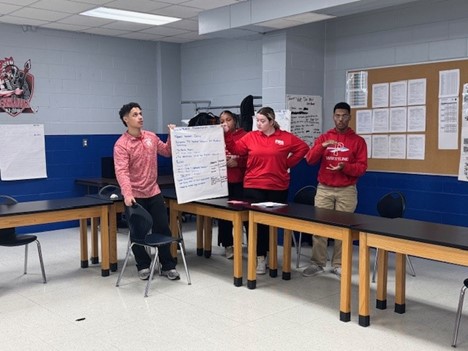
Air Force cadets collaborate and present their ideas with confidence and teamwork during a peer learning session.
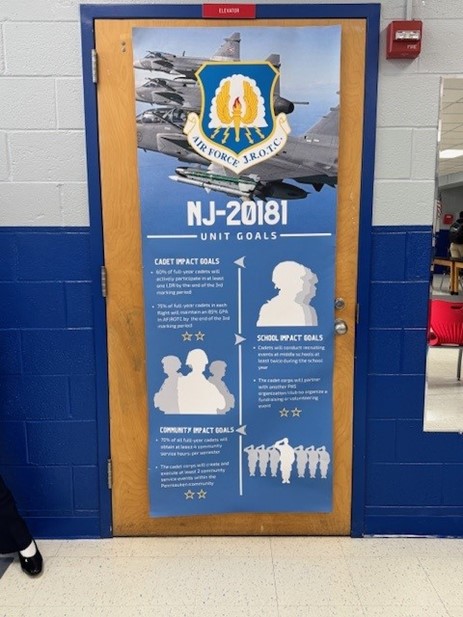
AFJROTC cadets set their unit goals for the school year. Through leadership, service and dedication, they are striving to make a meaningful difference in their lives, school, and community.
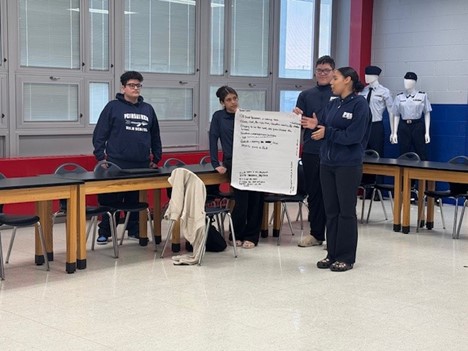
The Air Force JROTC program builds students’ teamwork, communication, and critical thinking skills for lifelong personal and career success.
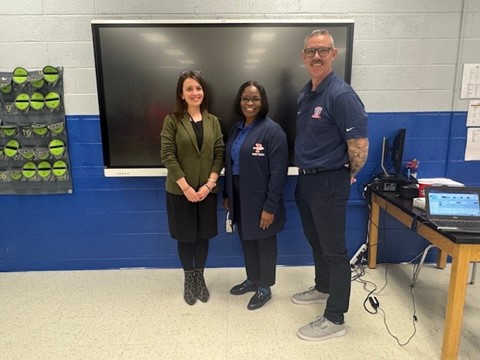
Celebrating the dedicated staff and instructors who inspire, mentor and shape the future of the AFJROTC cadets with excellence, integrity, leadership, citizenship and personal growth. Pictured from left to right: Tarah Gillespie, Supervisor of Curriculum and Instruction; Senior Master Sergeant Vivian Bender, Aerospace Science Instructor; and Chief Master Sergeant Daniel Bouchee, Senior Aerospace Science Instructor.
Winslow Township School District, Winslow Township High School - Radio and Television Program of Study
The Radio and Television career and technical education program of study prepares students for careers in the ever-evolving television, film and communications industries. It focuses on the core areas of television and film such as advanced techniques in video production, lighting, audio, field recording, digital editing, motion graphics, software applications, and mobile broadcasting. The program offers hands-on training in television and film production, using NewTek TC1 and 3Play systems—industry-standard tools used by leading broadcast networks.
This program has experienced a steady growth in student interest. Students have free access to the Adobe Creative Suite and can obtain certifications in a range of areas including Adobe Premiere, After Effects, Photoshop, and Illustrator. The program helps prepare students for fields such as editing, camera operation, directing, and live broadcasting. As a CTE program of study, students enrolled in this program are eligible to receive three credits from Rowan College of South Jersey as part of a dual credit agreement.
Winslow Township High School has branded this robust program as "Studio 106." Graduates of the Studio 106 program have gone on to work for companies such as Disney, NFL Films, and many other organizations in various levels of production. Over twenty former graduates have volunteered to return to Winslow Township High School to participate in their annual career expo, called Director's Cut. This event is a one-of-a-kind experience for their current students to have an opportunity to learn from former students. The insight and guidance provided to students gives them a real advantage in what they need to succeed in today’s industry.
In 2025, Studio 106 students won a High School Student Production Award from the National Academy of Television Arts and Sciences (NATAS) - Mid Atlantic Chapter in the category of Sports Story or Segment for “Piece By Piece.” The NATAS is one of the most respected organizations in the television industry, recognizing excellence in broadcast work from high school students to seasoned professionals. Adding to their achievements, students also received recognition from the Telly Awards for “Piece By Piece,” earning a Silver Award in the Specialty – Best Student category and a Bronze Award in the General – Student category. The Telly Awards celebrate outstanding video content in today’s dynamic media landscape, honoring work from advertising agencies, television stations, production companies and publishers worldwide.
The primary goal of the Winslow Township Television and Radio Broadcasting program is to inspire students to pursue careers in the various media fields and provide them with all the tools necessary to leave high school, not only college and career ready, but most importantly, leaders in the industry.

Studio 106 students and Mr. Norman Ingram, TV Production Teacher
East Brunswick Magnet School – Agriculture, General
The agriculture career and technical education program of study emphasizes foundational principles and practices in agricultural research and production, with a focus on applying knowledge to address real-world challenges in the agriculture industry. Students gain hands-on experience in floriculture, plant and animal science, food science and biotechnology. The program uses the Curriculum for Agriculture Science Education (CASE) developed by the National Council for Agricultural Education (The Council). Teachers are required to obtain certification by the Council in order to teach each of the CASE courses in the sequence. The program at East Brunswick Magnet School consists of introductory, foundation and specialization courses, and a capstone. They include Introduction to Agriculture, Food and Natural Resources; Plant Science (foundation), Animal Science (foundation), Animal Health and Veterinary Science, Animal and Plant Biotechnology (specialization), Food Science and Safety (specialization), and Agricultural Research and Development (capstone). Students who have successfully completed a specific CASE course taught by a CASE certified teacher have the opportunity to earn up to 17 transfer credits from Rutgers, School of Environmental and Biological Sciences, and up to 21 transfer credits from Delaware Valley University.
The FFA (nee Future Farmers of America) career and technical student organization (CTSOs) is an integral component of this program and students have the opportunity to enhance their career, employability, and leadership skills through a variety of activities such as conferences awards and competitive events which are conducted at the local, state and national levels. Leadership development is foremost among the goals for FFA. Leadership and career development of students is achieved by their participation in community projects and through networking with business and industry.
Quarterly fundraising events are organized throughout the academic year to support costs related to FFA student involvement. One such event, Floral Design Night, invites community members to participate in a hands-on workshop where they learn the art of floral arrangement and leave with a professionally crafted creation.
The agriculture program of study at East Brunswick Magnet School plays a vital role in preparing students for success beyond the classroom. By combining academic instruction and real-world experiences, the program equips students with the academic knowledge and technical skills, leadership qualities, and career readiness needed in today’s evolving workforce. Whether students pursue opportunities in the agriculture industry or related careers, this program lays the foundation for personal growth, lifelong learning, and meaningful contributions to their communities and the broader economy.
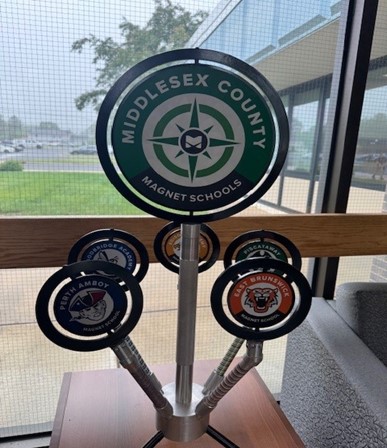
The Middlesex County Magnet Schools offer CTE programs of study at five campuses: East Brunswick, Perth Amboy, Piscataway, Edison and Woodbridge.
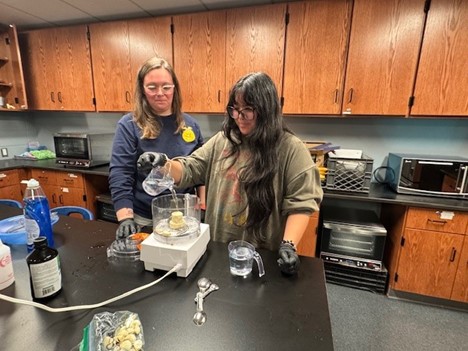
Focused and determined, a student fine-tunes her agriscience project, while her teacher looks on during prep for an upcoming career development event at the New Jersey State FFA Convention.
Pictured from left to right. Ms. Kylie Naylor, Agriculture CTE Teacher, Student
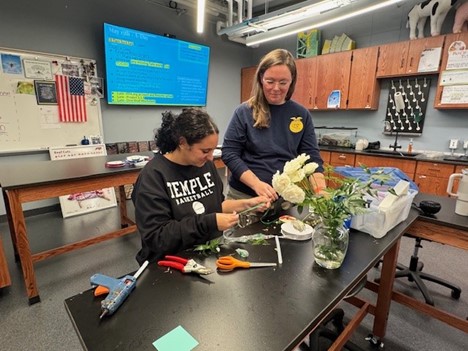
Students hone real world skills through the creation of floral decorations for their prom.
Pictured from left to right. Student, Ms. Kylie Naylor, Agriculture CTE Teacher

Floral masterpieces crafted by students for a memorable prom celebration.
The Army Junior Reserve Officer Training Corps (JROTC) career and technical education (CTE) program of study at Lakewood High School provides students with a strong foundation to develop academic excellence, leadership and management skills, self-confidence, discipline, strong character, integrity, and civic responsibility.
The program uses the Leadership Education and Training (LET) curricula that includes core courses and elective course options approved by the United States Army. The curricula are overseen and updated by the U.S. Army Cadet Command, which is responsible for the administration and training of Army JROTC programs nationwide. It includes coursework in leadership, civics, geography and global awareness, military principles, health and wellness, language arts, life skills, and U.S. history. The curricula also promote the development of core abilities such as a capacity for life-long learning, communication, responsibility for choices, good citizenship, respectful treatment of others, and critical thinking skills.
Community service is a major component of the JROTC program and many students at Lakewood High School have accrued points because of volunteering in their community, which has resulted in rank promotions. As a CTE program of study, students can also earn college credits as part of a dual enrollment program with Berkeley College in Woodland Park, New Jersey.
Being a member of the Army JROTC CTE program gives students an advantage as they consider pursuing a military career, postsecondary education and/or a non-military career path. Serving in the military provides young men and women the opportunity to serve their country with honor and distinction and learn valuable knowledge and skills that are transferrable to high skill, high wage, and in-demand civilian careers.
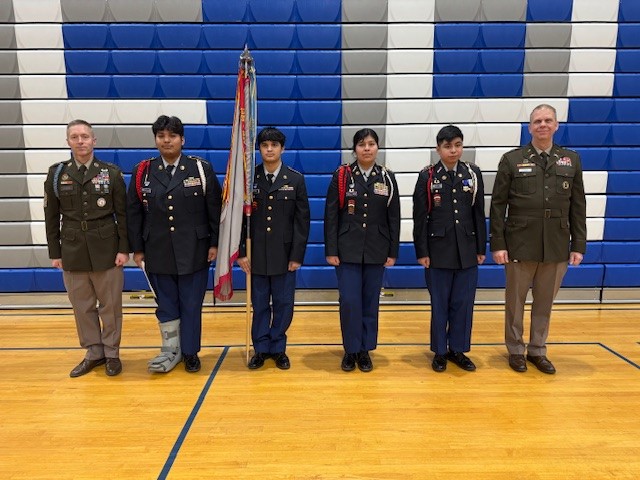
Pictured from left to right
Sergeant Major Johnson (retired), Student, Student, Student, Student, Major Combs (retired)
Sussex County Technical School - Natural Resources/Conservation, General
The Natural Resources/Conservation career and technical education program of study focuses on studies related to the natural environment and its conservation, use, and improvement. Topics covered include the climate, air, soil, water, land, fish and wildlife, and plant resources; and instruction in the basic principles of environmental science and natural resources management; and the recreational and economic uses of renewable and nonrenewable natural resources.
The program uses the Curriculum for Agriculture Science Education (CASE) developed by the National Council for Agricultural Education (The Council). Teachers are required to obtain certification by the Council to teach each of the CASE courses in the sequence. The program at Sussex County Technical School consists of introductory, foundation and specialization courses, and a capstone. They include Introduction to Agriculture, Food and Natural Resources (introduction); Natural Resources and Ecology (foundation), Environmental Science Issues (specialization) and Agricultural Research and Development (capstone). Students who have successfully completed a specific CASE course taught by a CASE certified teacher have the opportunity to earn 15.5 credits from Rutgers University, twelve credits from Delaware Valley University, and three credits from the State University of New York (SUNY) Cobleskill.
Students learn to solve problems, conduct research, analyze data, work in teams, and take responsibility for their work, actions, and learning. For example, students work in groups to determine the efficiency and environmental impacts of fuel sources in a practical learning exercise.
A school-based enterprise and cooperative learning are the structured agriculture experiences offered to students. Students in the school-based enterprise create floral arrangements for the school community and public such as retirement events, weddings, baby and bridal showers. Farmside Gardens, a local horticulture business that provides farming supplies, floral arrangements, plants and vegetables, provides students with a paid job experience. Students are responsible for floral arrangements, potting, and assisting customers within the garden store and greenhouse.
.jpg)
The agriculture program of study fosters student development by combining rigorous academic instruction with hands-on, experiential learning opportunities, nurturing growth inside and outside of the classroom.
.jpg)
Students engage in experiential learning by actively participating in plant cultivation and greenhouse management, allowing them to develop practical skills and apply theoretical knowledge in real-world settings.
.jpg)
Applied learning, integral to the curriculum, fosters responsibility and environmental stewardship among students.
Union County Vocational Technical School District
The Union County Vocational Technical School (UCVTS) District offers a wide range of career and technical education (CTE) programs for high school students and adults through their postsecondary programs. Secondary programs funded by the Perkins grant include digital arts, electrician, carpentry, welding, child development, computer science, Allied Health and more. The school offers five full time postsecondary CTE programs that include cosmetology, automotive engineering technology, electrician, plumbing technology, and Heating, Air Conditioning, Ventilation and Refrigeration Maintenance Technology.
A required component of secondary CTE programs of study is work based learning where students have exciting opportunities to participate in internships and other types of work-based learning. A recent grant from the Port Authority of New York/New Jersey and Essex County provided students with behind-the-scenes experiences at Newark Liberty International Airport Terminal A, George Washington Bridge, and Lincoln tunnel in 2024. These experiences provide opportunities for students to find potential jobs in these industries. Overall, the school district offers over 200 internships for students.
The automotive programs are popular with students. Secondary and postsecondary students can enroll in their automotive technology programs that are National Technicians Education Foundation and Automotive Service Excellence (ASE) certified. These programs provide students with the technical skills to prepare them for success in the automotive industry. Students are encouraged to take the ASE certification exams throughout the year. Instructional ASE areas include brakes, steering and suspension, electrical and engine performance. Most lessons include lectures, demonstrations and hands-on experience in a simulated commercial automotive repair shop.
The welding program has experienced a significant increase in enrollment in the last two to three years, and the school district intends to expand their capacity to accommodate this demand. They are also considering expanding their program offerings to include Esports and artificial intelligence programs.
During the 2024-2025 school year, Union County Career and Technical Institute’s students in their Interactive Media and Game Design (IMGD) and culinary programs developed an exciting end-of-year collaborative interdisciplinary portfolio project to showcase their strengths and skills. For their final exam, culinary students planned and executed a two-course meal consisting of either an appetizer, entree, or dessert. Students created their own menus, executed different plating techniques, and applied the fundamental cooking skills they learned throughout the course. IMGD students formed small teams to plan, record, and edit short media pieces centered on the culinary projects. The teams met their partner groups, devised styles and shot lists, and captured over three hours of footage to edit into 10-15 minute videos. The IMGD students utilized Adobe Premiere Pro, Audition, and After Effects to edit the footage into narrative focused and entertaining content. To celebrate and close the project, both classes met to reflect on the process and host a watch party - proudly showcasing their teamwork, creativity, and exemplary work!

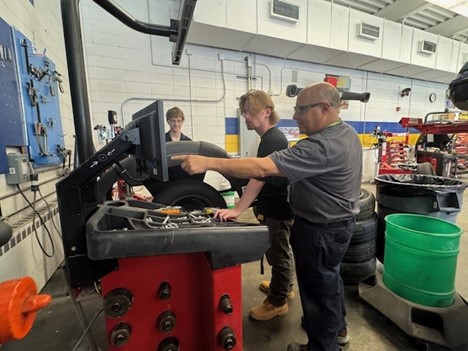
Students in the postsecondary automotive program learn practical knowledge and skills to succeed in the automotive industry.
Pictured left to right - Aidan Spadafino; Gavin Dugusz; and Joe Milanese, Automotive Program Instructor
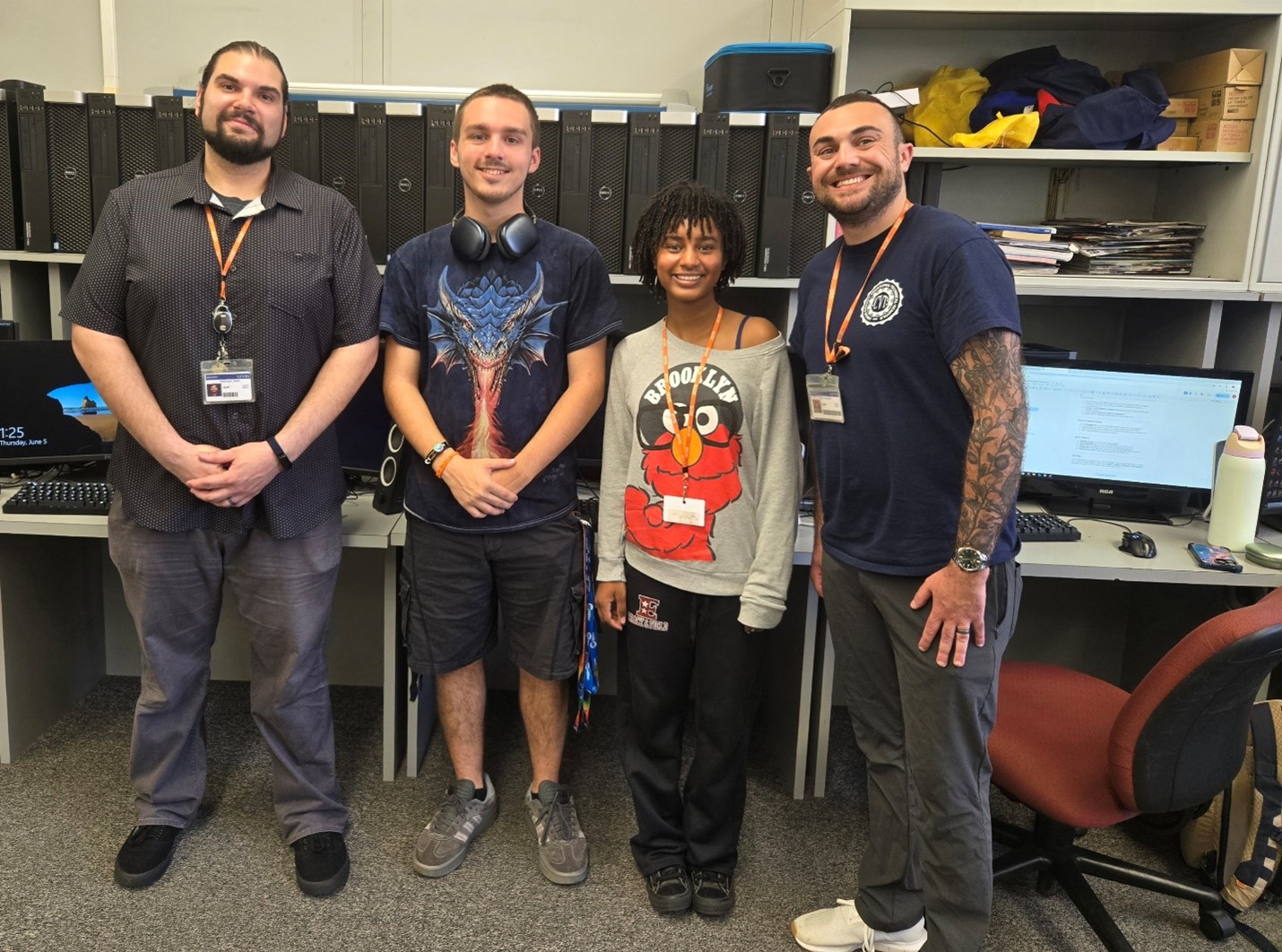
Students participating in the collaborative interdisciplinary portfolio project between the Culinary & Hospitality and Interactive Media and Game Design programs cultivated a diverse set of real-world skills, including technical proficiency, problem-solving, critical thinking, and effective communication.
Pictured from left to right - Justin Niemczyk, Interactive Media and Game Design Teacher; Student; Student; Jonathan Viola, Culinary Arts and Hospitality Teacher
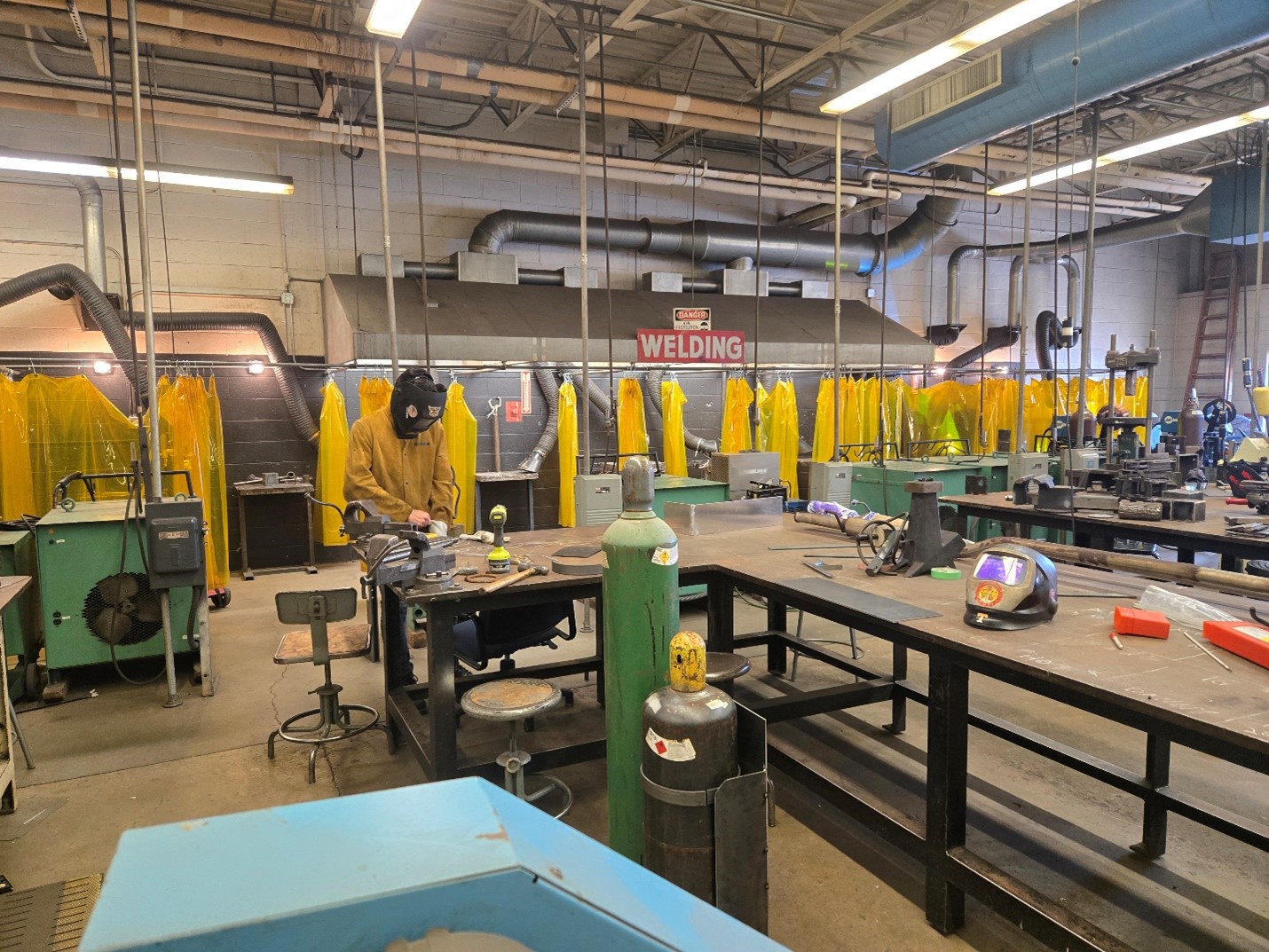
Precision and passion come together as this student develops his welding skills.
 Official Site of The State of New Jersey
Official Site of The State of New Jersey